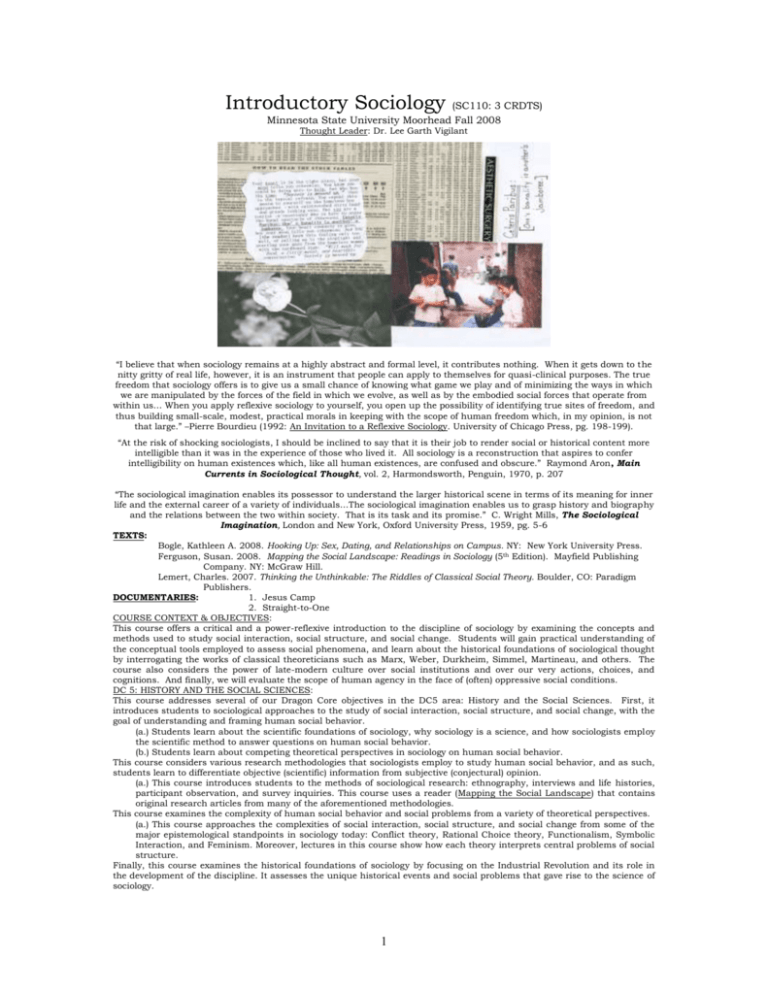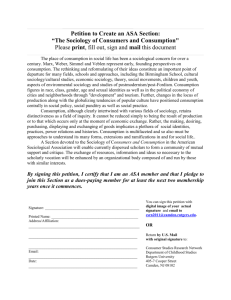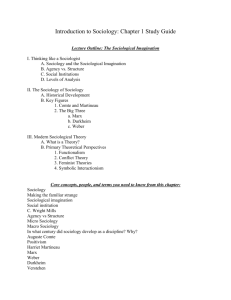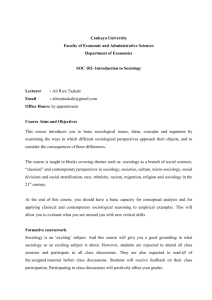Sociological Imagination - Minnesota State University Moorhead
advertisement

Introductory Sociology (SC110: 3 CRDTS) Minnesota State University Moorhead Fall 2008 Thought Leader: Dr. Lee Garth Vigilant “I believe that when sociology remains at a highly abstract and formal level, it contributes nothing. When it gets down to the nitty gritty of real life, however, it is an instrument that people can apply to themselves for quasi-clinical purposes. The true freedom that sociology offers is to give us a small chance of knowing what game we play and of minimizing the ways in which we are manipulated by the forces of the field in which we evolve, as well as by the embodied social forces that operate from within us… When you apply reflexive sociology to yourself, you open up the possibility of identifying true sites of freedom, and thus building small-scale, modest, practical morals in keeping with the scope of human freedom which, in my opinion, is not that large.” –Pierre Bourdieu (1992: An Invitation to a Reflexive Sociology. University of Chicago Press, pg. 198-199). “At the risk of shocking sociologists, I should be inclined to say that it is their job to render social or historical content more intelligible than it was in the experience of those who lived it. All sociology is a reconstruction that aspires to confer intelligibility on human existences which, like all human existences, are confused and obscure.” Raymond Aron, Main Currents in Sociological Thought, vol. 2, Harmondsworth, Penguin, 1970, p. 207 “The sociological imagination enables its possessor to understand the larger historical scene in terms of its meaning for inner life and the external career of a variety of individuals…The sociological imagination enables us to grasp history and biography and the relations between the two within society. That is its task and its promise.” C. Wright Mills, The Sociological Imagination, London and New York, Oxford University Press, 1959, pg. 5-6 TEXTS: Bogle, Kathleen A. 2008. Hooking Up: Sex, Dating, and Relationships on Campus. NY: New York University Press. Ferguson, Susan. 2008. Mapping the Social Landscape: Readings in Sociology (5th Edition). Mayfield Publishing Company. NY: McGraw Hill. Lemert, Charles. 2007. Thinking the Unthinkable: The Riddles of Classical Social Theory. Boulder, CO: Paradigm Publishers. DOCUMENTARIES: 1. Jesus Camp 2. Straight-to-One COURSE CONTEXT & OBJECTIVES: This course offers a critical and a power-reflexive introduction to the discipline of sociology by examining the concepts and methods used to study social interaction, social structure, and social change. Students will gain practical understanding of the conceptual tools employed to assess social phenomena, and learn about the historical foundations of sociological thought by interrogating the works of classical theoreticians such as Marx, Weber, Durkheim, Simmel, Martineau, and others. The course also considers the power of late-modern culture over social institutions and over our very actions, choices, and cognitions. And finally, we will evaluate the scope of human agency in the face of (often) oppressive social conditions. DC 5: HISTORY AND THE SOCIAL SCIENCES: This course addresses several of our Dragon Core objectives in the DC5 area: History and the Social Sciences. First, it introduces students to sociological approaches to the study of social interaction, social structure, and social change, with the goal of understanding and framing human social behavior. (a.) Students learn about the scientific foundations of sociology, why sociology is a science, and how sociologists employ the scientific method to answer questions on human social behavior. (b.) Students learn about competing theoretical perspectives in sociology on human social behavior. This course considers various research methodologies that sociologists employ to study human social behavior, and as such, students learn to differentiate objective (scientific) information from subjective (conjectural) opinion. (a.) This course introduces students to the methods of sociological research: ethnography, interviews and life histories, participant observation, and survey inquiries. This course uses a reader (Mapping the Social Landscape) that contains original research articles from many of the aforementioned methodologies. This course examines the complexity of human social behavior and social problems from a variety of theoretical perspectives. (a.) This course approaches the complexities of social interaction, social structure, and social change from some of the major epistemological standpoints in sociology today: Conflict theory, Rational Choice theory, Functionalism, Symbolic Interaction, and Feminism. Moreover, lectures in this course show how each theory interprets central problems of social structure. Finally, this course examines the historical foundations of sociology by focusing on the Industrial Revolution and its role in the development of the discipline. It assesses the unique historical events and social problems that gave rise to the science of sociology. 1 (a.) From the first week of class, students will learn about the historical roots of sociology in the Industrial Revolution, and about the great social transformations that occurred as a result. They acquire this through lectures on -and readings bythe “founding fathers/mother” of sociology: Karl Marx, Max Weber, Emile Durkheim, Auguste Comte, Georg Simmel, and Harriet Martineau. COURSE STRUCTURE & POLICIES: I strongly encourage class attendance and classroom participation. Assigned readings are to be read before each session. The expectation is that students will be fully prepared to answer questions and participate in discussions on texts. At each class session, the instructor will present a lecture that cogitates the broader analytical and sociological frames of the issue under study. Ideally, this lecture should take-up about 2/3 of the class session. The other 1/3 will be directed toward discussions and questions on assigned readings. I expect academic honesty in your writing assignments and testing procedures: see your Student Handbook. GRADES: 1st Exam (October 3rd) 25% 2nd Exam (November 3rd) 25% 3rd Exam (December 11th & December 12th) 25% Meditation (2-3 pages) & reading on Hooking Up (November 10th) 25% I encourage your informed participation in discussions on assigned readings. Feel free to submit written questions before class (esp. if you feel uncomfortable talking in large groups), or to express your thoughts & feelings during my lectures. You can stop me at ANY TIME during my lecture if something is unclear. Your questions, comments, and feelings about the information that I will present are the very catalysts for our sociological discourse. Each participant will read Kathleen A. Bogle’s Hooking Up: Sex, Dating, and Relationships on Campus and write a (2-3 pages) meditation where you provide (1) a brief summary of the study’s findings, (2) a critique of the research methodology, and (3) provide your opinion of the central idea of the book, that of the social transformation in American “dating” behavior. This succinct meditation & reading will constitute 25% of your final grade, and it should be typed. You have tremendous leeway in writing this paper in terms of format and style, but I you must take it to the Write-Site to have it checked for grammar and spelling infractions since I will take these elements into account when grading your meditations. This is a requirement because I want you to become acquainted with this exceptional resource for students at M.S.U.M. I require a bibliography for scholarly sources if you decide to use them in your paper. As an added requisite, you will read your mediations to the class. Exams are open-notes, short answers &/or essays. Exam questions are formulated during the lecture period. Students are strongly urged to form study groups. Each exam is worth 25% of your final grade. I use the student-driven test questions format: current questions for this class are posted on my website at web.mnstate.edu/vigilant/IntroSoc.htm. Daily attendance is highly recommended. If you need special accommodations for exams, please contact Greg Toutges in the Disability Services Office CMU 114 (Tele: 477-5859): I am pleased to make these arrangements on your behalf. THEMES AND READING ASSIGNMENTS (Aug. 25th) An Introduction to the “Sociological Imagination” 1. Lemert, Thinking the Unthinkable, Preface and Chapter 1 (The Impossible Reasons of Modern Civilizations) th th (Aug. 27 – Sept. 5 ) A Young Science (On the (His)torical Foundations of Sociology) “Without distorting the meaning of this expression, we can, in fact, call all beliefs and all modes of behaviour instituted by the collectivity ‘institutions’; sociology can then be defined as the science of institutions, their genesis and the functioning.” Emile Durkheim, The Rules of Sociological Methods (firs published in French 1895); in Kenneth Thompson (ed. and trans.), Readings from Emile Durkheim, London: Routledge, 1985, pg.67. 1. Mills’ The Promise (pg. 1) 2. Edin & Kefalas, Promises I can Keep (pg. 7) 3. Lemert, Thinking the Unthinkable, Chapters 2 & 3 (Sept. 8th – 12th) Culture & Social Change: Resisting McDonaldization “Culture consists of patterns, explicit and implicit, of and for behavior, acquired and transmitted by symbols, constituting the distinctive achievement of human groups, including their embodiments in artifacts; the essential core of culture consists of traditional (i.e., historically derived and selected) ideas and especially their attached values; culture systems may, on the on hand, be considered as products of action, on the other as conditioning elements of further action.” A.L. Kroeber & C. Kluckhohn, Culture: A Critical Review of Concepts and Definitions, New York, Vintage Books, 1963, pg. 181 1. Ritzer, The McDonaldization of Society (pg. 662) 2. Eitzen, The Atrophy of Social Life (pg. 672) 3. Velliquette and Murray, The New Tattoo Subculture (pg. 70) 4. Lemert, Thinking the Unthinkable. Chapter 4 th nd (Sept. 15 – 22 ) Socialization (or, ‘Learning to be Human’) “Social exchange differs in important ways from strictly economic exchange. The Basic and most crucial distinction is that social exchange entails unspecified obligations.” Peter M. Blau, Exchange and Power in Social Life, New York, Wiley, 1964, pp. 88-114. 1. Lewis, Learning to Strip: The Socialization Experiences of Exotic Dancers, (pg. 127) 2. Dyer, Anybody’s Son Will Do (pg. 144) 3. Lemert, Thinking the Unthinkable. Chapter 5 (Sept. 24th – Oct. 1st) (Meaningful) Social Interaction and Group Praxis “Society is merely the name for a number of individuals, connected by interaction… If society is conceived as interaction among individuals, the description of the forms of this interaction is the task of the science of society in its strictest and most essential sense.” Georg Simmel, Fundamental Problems of Sociology: Individual and Society (first published in German, 1917); ed. and trans. Kurt H. Wolff, The Sociology of Georg Simmel, NY: Free Press, 1950, pg. 10-11. “It’s all about the Benjamins!” –P. Diddy 1. Boswell and Spade, Fraternities and Collegiate Rape Culture, (pg. 242) 2. Williams, Shopping as Symbolic interaction, (pg. 181) 3. Lemert, Thinking the Unthinkable. Chapter 6 2 (Oct. 3rd) EXAM # 1 (Oct. 6th – 10th) Stratification: Locally/Globally “By contrast, countries with high income levels are experiencing increasing increases in rates of cancer, respiratory illnesses, stress and cardiovascular disorders, and birth defects, as well as falling sperm counts. A growing body of evidence links all these phenomena to the by-products of economic growth-air and water pollution, chemical additives and pesticide residues in food, high noise levels, and increased exposure to electromagnetic radiation.” David Korten, When Corporation Rule the World, CA: Kumarian Press, 1995, pg. 41 1. Ehrenreich, Nickel-And-Dimed, (pg.292) 2. Domhoff, Who Rules America?: The Corporate Community and the Upper Class, (pg.266) 3. Lemert, Thinking the Unthinkable. Chapter 12 th th (Oct. 15 - 17 ) “R/A/C/E”: Rituals of Blood/Rituals of Place “Race, as a meaningful criterion within the biological sciences, has long been recognized to be fiction. When we speak of ‘the white race’ or ‘the black race’, or ‘the Jewish race’ or ‘the Aryan race’, we speak in biological misnomers and, more generally, in metaphors. Nevertheless, our conversations are replete with usages of race which have their sources in dubious pseudosciences of the eighteenth and nineteenth centuries.” Henry Louis Gates, Jr. ‘“Race” as a Trope of the World’ in H.L. Gates (ed.), ‘Race’, Writing and Difference, Chicago University Press, 1986. 1. Kim, Out of Sorts: Adoption and (Un)Desirable Children, (pg. 393) 2. Bonilla-Silva, “New Racism,” Color-Blind Racism, and the Future of Whiteness in America, (pg. 359) 3. Lemert, Thinking the Unthinkable. Chapter 10 (Oct. 20th – 24th) After/Feminism: Illuminating “Girl Power” “I am distinguishing between two forms of patriarchy: private and public. They differ on a variety of levels: firstly, in terms of the relations between the structures and, secondly, in the institutional form of each structure. Furthermore, they are differentiated by the main form of patriarchal strategy: exclusionary in private patriarchy and segregationist in public patriarchy. Private patriarchy is based upon household production, with a patriarch controlling women individually and directly in the relatively private sphere of the home. Public patriarchy is based on structures other than the household, although this may still be a significant patriarchal site.” Sylvia Walby, Theorizing Patriarchy, Oxford, Blackwell, 1990, pg. 178 1. Lucal, What It Means to be Gendered Me: Life on the Boundaries of a Dichotomous Gender System, (pg. 315) 2. Lesko, Our Guys/Good Guys: Playing with High School Privilege and Power, (pg. 330) 3. Lemert, Thinking the Unthinkable. Chapters 9 & 11 (Oct. 27th – 31st) The Transformation of Intimacy: Family, Sex, and Love in Late-Modernity “We are living, I believe, through a transitional and contested period of family history, a period after the modern family order, but before what we cannot foretell. Precisely because it is not possible to characterize with a single term the competing sets of family cultures that co-exist at the present, I identify this family regime as post-modern. The post-modern family is not a new model of family life, not the next stage in an orderly progression of family history, but the stage when the belief in a logical progression of stages breaks down. Rupturing evolutionary models of family history and incorporating both experimental and nostalgic elements, ‘the’ post-modern family lurches forward and backward into an uncertain future.” Judith Stacey, Brave New Families, NY: Basic Books, 1990, pg.18 1. Cherlin, The De nstitutionalization of American Marriage, (pg. 604) 2. Crittenden, The Mommy Tax, (pg. 604) 3. Documentary: Straight to One rd (Nov. 3 ) EXAM # 2 th th (Nov. 5 - 7 ) The Social Meaning of Learning “[E]ach family transmits to its children, indirectly rather than directly, a certain cultural capital and a certain ethos. The latter is a system of implicit and deeply interiorized values which, among other things, helps to define attitudes towards the cultural capital and educational institutions. The cultural heritage, which differs from both points of view according to social class, is the cause of the initial inequality of children when faced with examinations and tests, and hence of unequal achievement.” Pierre Bourdieu, ‘The School as a Conservative Force’ in J. Eggleston (trans. and ed.), Contemporary Research in the Sociology of Education, London, Methuen, 1974. Pg. 32-28. 1. Dog & Erdoes, Civilize Them with a Stick, (pg. 571) 2. Kozol, Still Separate, Still Unequal: America’s Education Apartheid, (pg. 578) (Nov. 10th – 14th) Readings/Meditations (2-3pgs.) on Hooking Up: Sex, Dating, and Relationships on Campus (Nov. 17th & 19th) Sociology of Religion (or, Where are you spiritually?) “The term ‘religion’ is derived from religio, the bond of social relations between individuals; the term ‘sociology’ is derived from socius, the bond of companionship that constitutes societies. Following Durkheim (1961), we may define religion as a set of beliefs and practices, relating to the sacred, which create social bonds between individuals. We may define sociology, naively, as the ‘science of community’. Sociology in general and the sociology of religion in particular, are thus concerned with the processes which unite and disunite, bind and unbind social relationships in space and time.” Bryan S. Turner, Religion and Social Theory, London, Sage, 1983, pg. 8 1. Weber, Protestant Ethic & The Spirit of Capitalism, (pg. 504) 2. Chaves, Abiding Faith, (pg. 511) 3. Lemert, Thinking the Unthinkable. Chapter 7 4. Documentary: Jesus Camp (Nov. 21st – Dec. 1st) The Alchemy of Illness/Sickness “Medical sociology centers on the social construction of health and illness—that is, a construction shaped by the many elements of the social order and often independent from biomedical phenomena.” Phil Brown ‘Themes in Medical Sociology’, Journal of Health Politics, Policy and Law, Vol. 16, No. 3, Fall, 1991. 1. Karp, Illness & Identity (pg. 557) 2. Oberlander, The U.S. Health Care System: On a Road to Nowhere?, (pg. 528) (Dec. 3rd -8th) The Revolution Will Be Cybercasted “Men make their own history, but they do not make it as they please; they do not make it under circumstances chosen by themselves, but under circumstances directly found, given and transmitted from the past. The tradition of all the dead 3 generations weighs like a nightmare on the brain of the living.” Karl Marx, The Eighteenth Brumaire of Loius Bonaparte [1852]; Moscow, Progressive Publishers, 1954, pg.10 1. Johnson, What Can We Do?: Becoming a Part of the Solution, (pg. 697) 2. Brecher, et al., Globalization and Social Movements, (pg. 680) 3. Lemert, Thinking the Unthinkable.” Violence, War, and the Short 20th Century, 1914-1991,” pg. 159 and Chapter 14 (12:00p.m. Thursday Dec. 11th Final Exam for 10:30 MWF Class) (9:00a.m. Friday Dec. 12th Final Exam for 8:30 MWF Class) Thought Leader: Education: Electronic Mail: Website: Telephone: Office Hours: Dr. Lee Garth Vigilant B.A., California State University Bakersfield; A.M. & Ph.D., Boston College vigilant@mnstate.edu web.mnstate.edu/vigilant 218/477-2034 (Office) Sociology & Criminal Justice Department, Lommen Hall 102-E (11:30a.m. - 4:30p.m. Mondays & Wednesdays or Tuesdays & Thursdays by appointment) Cover: From the New College of Sociological Pataphysics: “Ceteris Paribus.” (Photographic Collage, ’06). 4









